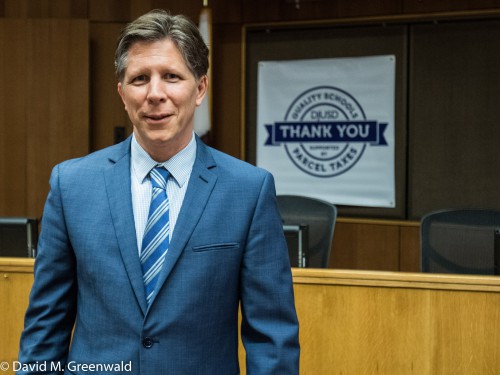

On Thursday night, dozens of teachers and others packed the school board meeting to complain about lower levels of salary and compensation for teachers in Davis Joint Unified School District compared to elsewhere.
There has been growing concern about the number of teachers leaving the district due to the pay discrepancy at DJUSD versus other fields and other districts. That dissent has been brewing even as it has been stifled over time by budget shortfalls and the need to raise parcel taxes, but it all came boiling out on Thursday.
Part of the problem that Davis faces, as John Bowes wrote in a June op-ed, even “after adding in parcel tax revenue, DJUSD is still just an average-funded school district. If there were no local parcel taxes, DJUSD would be funded well below the state average.”
The problem that the district has and that Superintendent Bowes failed to acknowledge is that, while the district is average in funding, it is below average in compensation. This means that the district has prioritized other spending over compensation. That might good for students and perhaps administrators, but teachers have a legitimate beef.
An article from August 2016 in the local paper shows that Davis salaries continue to lag compared with other districts. The article says, now, “for years, the Davis school district has lagged behind other districts in salary offerings, which has contributed to a teacher shortage in Davis.”
On Thursday, Superintendent Bowes, reading from a prepared statement, continued to play the role of the apologist, stating, “We are aware that there is a wage gap with some of our surrounding communities” but, at the same time, “we are committed to work to find ways be at or near the regional compensation average.”
He continued arguing that all parties need to agree “to the real facts on the ground, and work together to find real solutions.” He said, “In a district that is below the average state-funded  level for school districts, we need to come up with creative ways to raise revenues and/or re-prioritize spending.”
level for school districts, we need to come up with creative ways to raise revenues and/or re-prioritize spending.”
But if the district is pushed to average status by the parcel tax, the district should be able to offer average compensation.
The comments went over like a lead balloon with the teachers. DTA President Dianna Huculak basically argued that teachers “are experiencing a completely different reality” from what the superintendent described.
She added that teachers are working “120 percent,” meaning that they are going beyond the duties of a full-time position.
She said, “As school trustees, is it your position that having teachers, and in some cases entire departments, work 120 percent is an ‘educational best practice’? Do you maintain that it is beneficial for students to have even less meaningful access to their teachers? … Class size and caseload limits exist for a reason.”
We have seen references to the fact that teachers are paying out of pocket for their health care. In the August 2016 article for instance, a first year teacher is paying a huge percent of their gross monthly for health care. In one case cited in the article, that’s $12K a year on a $38,811 starting salary. That’s 32.75 percent of their salary.
Davis’ starting salary was $38,811 and maximum was $86,253 (that’s a 25-year teacher with a master’s degree). In Elk Grove the starting salary is $43,546 and goes up to $90,983 (in just 19 years).
Consider the cost of living in Davis and you get a sense for the depths of the crisis.
Here is the problem that the district faces.
First, clearly the district is disadvantaged by the Local Control Funding Formula (LCFF). That means that the district gets less in the way of funding than other districts.
But, as the superintendent pointed out in June, “the key takeaway for DJUSD is that the Local Control Funding Formula will never fund the type of schools and programs that Davis families have come to enjoy and expect.”
He continued, saying that “to achieve a sustainable fiscal framework where we can chart our own course, DJUSD must either identify additional local solutions to enhance revenue sources or find ways to reprioritize spending and programming. By eliminating our structural budget deficit, we will be able to then fully focus our attention and resources on the tackling the additional challenges described below.”
However, what seems to have happened is, over the last decade and probably even before, DJUSD has maintained its level of commitment to programs at the expense of teacher compensation. To some degree that makes sense, but it comes with serious downside risks.
If your pay gap is sizable enough teachers will leave the district. Or you will have problems recruiting new and qualified teachers who can go elsewhere and make a sizable amount more in salary and benefits.
That means that Davis, which prides itself on the quality of its schools, is not drawing perhaps on the best and most in-demand teachers.
The comments made by Teacher Karl Ronning were fairly telling as well. He indicated that he was “extremely offended” that the superintendent had gone on a listening touring speaking with students and also community leaders – but not teachers.
The Vanguard last week complained about transparency in the school system and the superintendent refused to turn over the list of people he had met with in the community to gain the feedback.
Mr. Ronning and many other teachers who spoke on Thursday called into question how many teachers left the district and why.
Many feel pressure to leave – after all, they can receive thousands of dollars more in salary and improved benefits. Many younger teachers are going elsewhere because they have to find a way to pay back their student loans.
This is rapidly becoming a crisis and, if it is one that is not solved, it will impact the district’s ability to pass the next parcel tax. They have a few years for that, but it seems likely that the community backs the relatively low-wage teachers over the high-wage administrators.
—David M. Greenwald reporting


I agree, but do we ever see the high wage administrators take a hit through wage decreases or layoffs?
These teachers are protesting at the wrong venue, they should be in Gov. Brown’s office demanding equal state monies for all schools.
But we all know where this ends up. Soon the DJUSD will be coming after Davis homeowners for more parcel taxes.
Perhaps you are correct, but I think they have a political problem trying to do that.
I will add that I argued last year pretty heavily for the need to go higher with the parcel tax and the argument fell on deaf ears. If we want to have great schools here, we have to spend the money and if it’s not coming from the state, then locally people will have to step up.
Problem is homeowners have gotten squeezed to where there’s not much blood left in that turnip.
It’s time to demand lower admin pay, admin layoffs and cutting some programs in order to up teacher compensation.
You can demand lower administrative pay (and probably should), but the number of administrators is very low and so you’re not going to get enough savings that way to increase compensation.
We don’t need to go high with the parcel tax, we need to go broader and eliminate the pointless exemptions.
Now that the parcel tax is in place could we have a superseding proposition that would eliminate the exemptions?
Think that would run into legal problems, but how much do we lose on exemptions? And do exemptions allow for passage where they wouldn’t pass otherwise? Those are the two questions you need to answer.
With all things considered if we’re an average revenue school district our teachers should also fall in the average compensation level. Why are they in the lower level? Are the funds being mismanaged? Too many special programs?
Precisely the question I asked.
“And do exemptions allow for passage where they wouldn’t pass otherwise? Those are the two questions you need to answer.”
It hardly matters now. We have the current tax in place for 6 years? If we placed a supplemental one in 2018 eliminating the exemptions and it did not pass we would be right where we are now.
In terms of how many exemptions there are and therefore what the increase would be I’m not sure. Maybe someone here knows or knows the total number of parcels as total revenue is known.
Is there a source for the number and compensation of school administrators at DJU and how their comp has increased over time?
The format of these meetings is bizarre. The Super drones on for 20 minutes reading a document that could have been distributed. I work for a major global company and I have not been to a meeting that terrible for at least a decade and that was in China. All the SB meeting seem to be like that.
Bowes seemed to address the AIM issue but to offer some BS on why he could not address it.
The point that many of the parents raised at Thursday’s school board meeting is that underpaying Davis teachers is NOT good for students. If you look at the research, teacher quality is the most important school-based factor affecting student achievement. It outweighs class size, facilities, and curriculum. Being an excellent (and not just average) school district requires us to attract and retain those quality teachers.
Yet, we don’t pay teachers for the quality of their teaching. Their pay is determined by how long they have held the job, regardless of their abilities. The best teachers in town are underpaid, but the bad ones are being overpaid.
“teacher quality is the most important school-based factor affecting student achievement”
I believe student quality is more important.
Perhaps, but teacher quality is the most important factor in student achievement improvement; just ahead of parent commitment and support…
The really sharp kids actually can do quite well with mediocre/poor teachers… know of several examples of kids who experienced those at DJUSD. If they have committed/supportive parents…
“School-based factors” are those associated with the school, not the student or the family. So, yes, my statement leaves out those other factors which also play an important role.
Keith
“Problem is homeowners have gotten squeezed to where there’s not much blood left in that turnip.”
This assertion is meaningless without knowing what amounts you are talking about. To assess the validity of the claim that homeowners are overtaxed, one has to know what you consider the “right amount” of taxation.
Given that the schools add significantly to the values of homes in the perhaps a transfer tax is better than a parcel tax anyway. Possibly we could have both with the parcel tax credited against the transfer tax. That way people either pay every year or they claim an exemption and pay when the house is sold.
Except for two things… as it stands, it is impossible…
and the other thing?